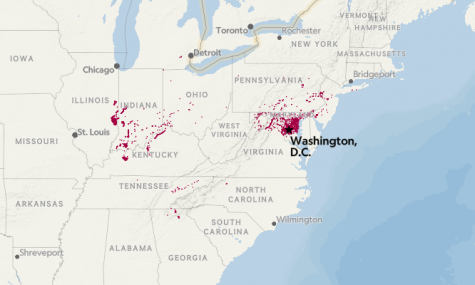Cicadas Swarm East Coast After Perfect Temperatures Hit

After 17 years of patience, “periodical” cicadas, also known as Brood X, are surfacing from underground, causing many people to feel disgusted and fearful.
According to an article by National Geographic, “trillions of the insects will once again burst from the ground and take to the trees, making loud mating songs as they harmlessly sip tree sap.”
High school student Arooj Vahora feels hesitant about the cicadas’ arrival because she has never experienced anything like it. “I feel like I would be terrified and probably run away from them or slowly back away … as soon as possible,” she admits.
“This summer will be crazy full of them, so I’ll be staying inside a lot of the time because I am absolutely terrified of bugs. Also, I am not looking forward to seeing them again in the next 17 years,” she shares.
Other students, like Emily Hollwedel, feel differently. Hollwedel doesn’t mind cicadas much because they are only here for a short period. “They don’t fly into me too much; I don’t really like unwarranted bug attacks,” she states.
Hollwedel mentions that the people who went through the previous Brood X in 2004 say it’s hard to walk outside without interacting with a cicada. “Having a bug hit me is one of my least favorite experiences, so I’m just bracing for that. Otherwise, I expect a lot of buzzing noises and red-eyed friends hanging around,” she notes.
Despite not wanting cicada interaction, she thinks that the 17-year cycle is interesting. She wonders “how do [cicadas] manage that 17-year gap?”
Bug expert Dr. Kelly Hamby explains that waiting 17 years requires carefully measuring time. “There have been reports of smaller emergences that are off cycle, but most of the population gets it right,” she details.
“Seeing the 17 year cicada emergence is absolutely amazing, this is a biological phenomenon thatis unique to the eastern United States,” Hamby says.
Centennial High School teacher Bethany Cunha also finds that the cicadas are amazing because of the timing, and she loves nature’s different life cycles of plants and animals. “Anytime I can watch something of this magnitude happen in the natural world, especially right outside my window, I feel the excitement and wonder I used to feel as a young kid when I discovered new things,” she says.
Cunha believes that most people will find cicadas to be annoying and a small percentage of people like herself will like them and feel unbothered by their presence. “I know I will be savoring these creatures being around the whole six weeks,” she admits.
At the end of the day, cicadas are a unique species of insect because they have 13 or 17 year life cycles. They live mainly on the east coast of the US, and their emergence can cause apprehension, and sometimes even fear, for those who live in this region.
No matter what people think about the cicadas, Hamby believes that the cicadas will make people have to think about insects daily for a short time.
Hamby hopes, “it will make people interested in the world and lives of insects.”
js
For more breaking news and photos, follow The Wingspan on Instagram and Twitter @CHSWingspan.





